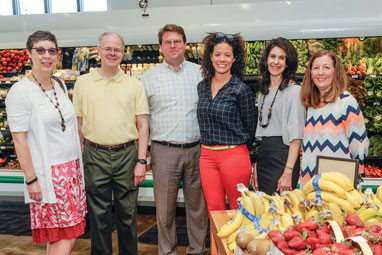SPARTANBURG, S.C. - It has all the seeds and nuts Dr. Ana Maria Wiseman, retired dean of international programs, needs to make her homemade granola. It carries the Turkish figs Dr. Britt Newman, assistant professor of Spanish, likes to snack on while grading papers. Its hot bar is a favorite for Dr. Laura Barbas Rhoden, professor of Spanish, and her family. It’s an easy walk from Wofford’s campus, and it carries three times the local products of other grocery stories in the area.
It’s the Hub City Co-op, the state’s first cooperatively owned grocery store, and Wofford people worked to make it a reality and are still celebrating its spring opening.
“Wofford and Spartanburg have grown up together, and the college’s involvement in the co-op is an authentic result of that long relationship,” says Dr. Phillip Stone ’94, college archivist and another Wofford co-op member. “Wofford’s faculty, staff and alumni were among the first to see a need for this type of business in the community.”
Barbas Rhoden, vice chair of the co-op board, explains that member-owners power co-ops. She says dozens of Wofford people helped raise the $2.7 million in local and national financing required to open the store. They lobbied, invested, donated, wrote news releases, answered email accounts, submitted copy for newsletters and served on the board.
“Amid the buzz about community health and environmental sustainability, the commitment of Wofford faculty and staff to the hard — and fun — work of making their local community stronger, healthier and more vibrant and sustainable is truly wonderful,” she says.
City Council member Erica Brown ’00 lives three blocks from the new co-op. It’s in her district. During the grand opening of the event, she was on hand to cut the ribbon and thank the community for its support.
“The city is 100 percent behind this because it keeps the money local and it makes living downtown even more desirable,” she says.
While earning his Ph.D. at the University of North Carolina, Newman and his family spent a good bit of time in Carrboro. According to Newman, the hub of that community was a co-op grocery store.
“It was a nice mixing place,” says Newman. “I went because the people there interacted and engaged with their neighbors.”
Because Wofford is in the business of recruiting people to come to Spartanburg — about 450 each year in the incoming class as well as prospective faculty and staff from across the country — places like the co-op demonstrate Spartanburg’s vitality and diversity.
“We want our students to go beyond the campus,” says Newman. “Through the Hub City Co-op, they can learn about what’s going on in the community, appreciate the types of things produced locally and see a different type of business model.”
Newman is planning ways to take his students to Little River Roasting Co., owned and operated by Gervais Hollowell ’85, and he’s considering ways to incorporate a visit to the Hub City Co-op as well.
“It’s important to help students understand that they are linked to others through the production and consumption process,” says Newman. “We also teach our students through modeling a certain way of living. One way of living out an ethical life is by getting involved and by committing to those around us to make improvements in the world. The Hub City Co-op is one example of that kind of effort.”
For more information about the co-op, visit hubcity.coop
Becoming stronger and healthier
Wofford joins community in bringing state’s first cooperatively owned grocery store to Spartanburg
Wofford people worked to make the Hub City Co-op a reality. Among them are, from left, Dr. Ana Maria Wiseman, retired dean of international
programs; Dr. Phillip Stone '94, college archivist; Chris Story '93, assistant Spartanburg City Manager; Erica Brown '00, Spartanburg City Council member; Dr. Laura Barbas Rhoden, professor of
Spanish; and Sharyn Pittman '92.
2016-06-09